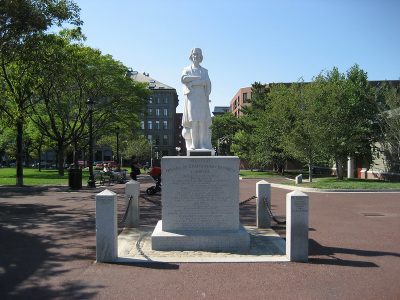Beheaded in June, the Christopher Columbus statue in the North End will not return to the neighborhood’s Christopher Columbus Park.

The repaired statue will instead relocate to a new affordable housing development funded by the Massachusetts Knights of Columbus, Mayor Marty Walsh announced at a virtual conference Monday. The Boston Art Commission will design a new statue in its place to celebrate Italian immigrants.
Walsh said the decision to relocate the statue stemmed from concerns regarding its structural integrity after repairs.
Although some local activists are happy to see the statue removed from the public park, others expressed concern over the mayor’s reasoning, especially as Columbus Day approaches.
Kisha James, longtime member of the United American Indians of New England, said some in the Italian American community view Columbus, who was Italian, as their symbol.
“I think that it’s sort of a cop-out, because [Walsh] doesn’t want to offend the very vocal Italian American community … who have been advocating for the statue’s restoration,” James said. “It’s sort of a way of not actually acknowledging the racism in the city of Boston.”
The statue, which was imported from Italy, had stood in the park since 1979, where it was intended to symbolize the Italian heritage of many North End residents.
Although terms like “Columbia” tended to broadly and conceptually symbolize America after the nation’s founding, Italian immigrants adopted imagery of Columbus himself largely as a means of validating their American identity, said Margaret Newell, author of “Brethren by Nature: New England Indians, Colonists, and the Origins of American Slavery.”
Newell added that statues depicting Columbus and celebrations of Columbus Day began largely in the 20th century.
“I think there is a romanticization,” Newell said. “Americans were trying to create a past for themselves in the context of revolution because all these European countries, they had a Roman past in some cases. They had antiquity. They had long histories.”
James, who also founded the Wellesley College Native American Student Association, said that in addition to the statue’s removal, the park itself should be renamed. She said, however, that many of the city’s vocal Italian Americans may oppose such a change.
James has also advocated for renaming Columbus Day to Indigenous Peoples’ Day in Boston. Currently, 10 states and dozens of cities — including Cambridge and, recently, Salem — recognize Indigenous Peoples’ Day instead of Columbus Day.
She added that Walsh and other civic leaders have refused to meet with Native American rights groups to discuss renaming the holiday since at least 2016.
“There’s sort of this idea of white saviorism and, ‘We’re going to do an Indigenous Peoples’ Day campaign without consulting with Native people,’” James said.
Despite resistance by the City and state, James said she believes there is enough support for Indigenous Peoples’ Day statewide for a resolution to pass. She added that those advocating for the Columbus statue’s preservation are a vocal minority.
“I think that New England is just waking up to the continued presence of Native Americans there,” Newell said. “The states have had to confront them and become aware of the Native American population because of the number of tribes that have received federal recognition and been involved in Supreme Court cases.”
A Massachusetts local, James added that many residents think the state’s Native American population “died off” years ago. She said questions about her status as a Native American began in elementary school and have continued through college.
She said the younger generation has the greatest potential to change their attitudes, and that public schools should modify their curriculum to emphasize Native American history rather than maintain Columbus’ legacy.
James added that the presence of statues in Boston celebrating white colonizers often reinforces the erasure of the region’s Native Americans.
Newell said monuments are complicated, especially because they don’t always reflect accurate representations of the past.
“I think they’re often more about the present, the moment in which they’re constructed, than they are about the past,” Newell said.
She added that the expenses and government connections required to install statues often limit influence over them to the rich and powerful.
“They are sometimes aspirational,” Newell said. “They’re sometimes actually rewriting history.”






















































































































